|
Station Road
Groombridge
01892 864275
http://www.junctioninngroombridge.co.uk/
https://whatpub.com/junction-inn
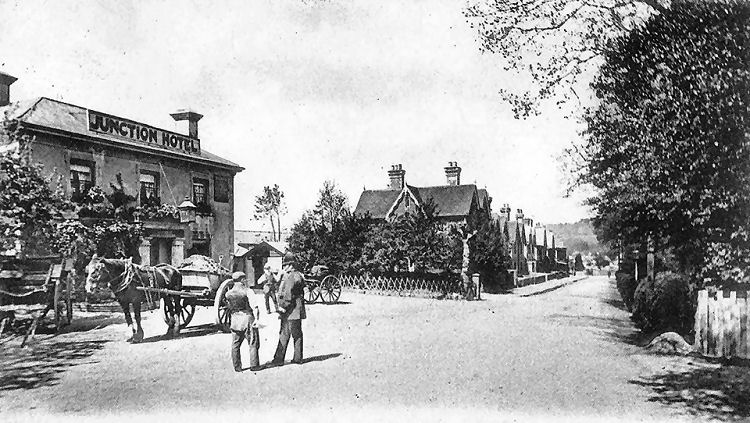
Above photo, 1905, kindly sent by whitemf.53 |
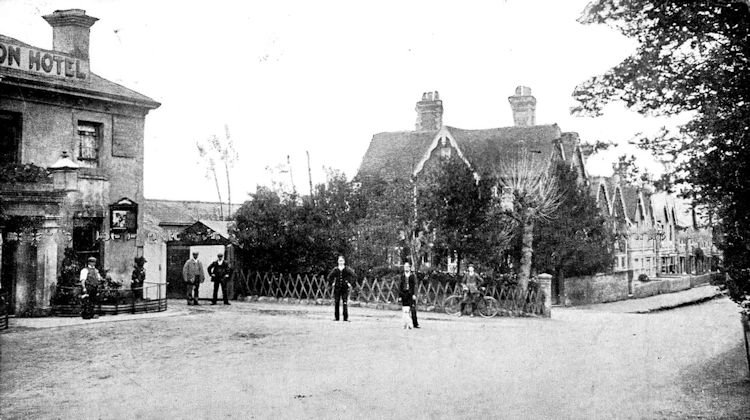
Above photo, date unknown. |
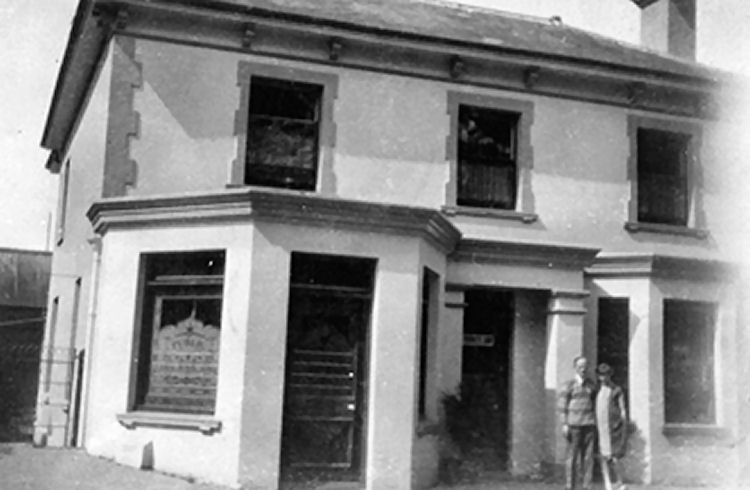
Above photo, date unknown. |
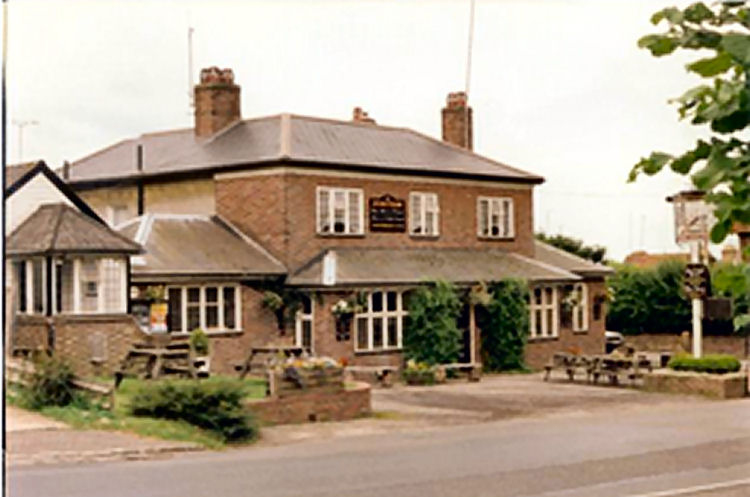
Above photo, circa 1980s. |
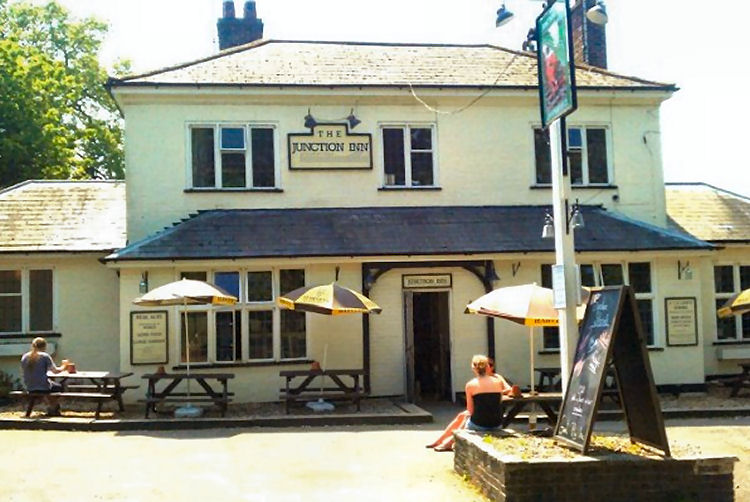
Above photo 2014. |
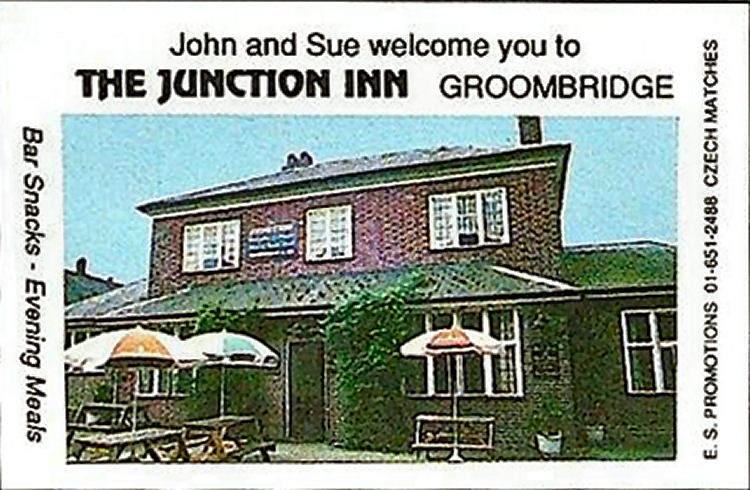
Above matchbox, circa 1980s. |
Technically this pub is in East Sussex, but as Groombridge is apparently
cut into two, with half being in Kent I'm including all the pubs in this
village.
|
Kent & Sussex Courier, 8th July 1881 .
GROOMBRIDGE.
RUN OVER BY A TRACTION ENGINE AND KILLED.
An inquest was held at the
Tunbridge Wells Infirmary on Monday afternoon last by J. Rogers, Esq.,
coroner, on the body of Wm. Isaac Rye, who met with his death on the
preceding Tuesday, under circumstances detailed in the evidence:-
The
jury of which Mr. Walsh was chosen the foreman, having viewed the body,
Sarah Stephenson, a married woman, of Groombridge, deposed to the
deceased being her brother. He was twenty last birthday, was a labourer,
and married. On the previous Wednesday in consequence of receiving
information of the accident, she started out for Edenbridge, but on the
way met her brother being brought in a van. She asked him how he became
hurt, and he said he was offered an iron "nut", and his taking that was
partly the cause of the accident. They were then told not talk to him.
His wife did not live with him. She came with him to the Infirmary, and
afterwards visited him on the Thursday. He was not then insensible.
Alfred Knight, a lad aged 11, a schoolboy, living at Edenbridge.
deposed that on the previous Tuesday he saw a traction engine in
Greybury Lane. There was one carriage attached to it, which was empty.
It had been taking brick sand then returning to the brick- yard. There
was a man riding on the truck. That was at about half past six, and half
an hour before that he found a "nut,” which he believed belonged to the
engine, was having his tea when the engine passed, but he ran out and
offered the “nut” to the deceased, who was on the truck. He went right
between the engine and the truck attached while in motion to give it
him. He held the nut up to the deceased, and he reached out and took it
out of his hand. The driver of the engine told him to get out the way,
and he did so. On looking round a moment afterwards he saw the wheels
passing over deceased's body. One wheel went over the lower part his
body, and the other over the upper part his legs. The engine was stopped
directly, someone calling out that there was a man run over.
In answer
to the jury, witness said that the whole affair occurred in a few
moments. He did not see deceased fall.
The Coroner remarked that the
lad, by his conduct, put his own life in danger, and hoped this would
warn him not to be indiscreet.
Annie Seal, of Godstone Grove,
Edenbridge, a single woman, deposed that on the previous Tuesday she was
standing some 30 to 40 yards from the engine, which was going towards
the brickyard at about seven o'clock, when she saw a man riding on the
front of the truck, with his feet on the back the engine. The last
witness went between the engine wheels and truck wheels, but she was not
close enough to see what happened. She afterwards saw the deceased
tumble off the truck, and two wheels passed over him. She went to where
he was lying, and asked him if he was much hurt. He replied! "I don t
know. I don’t think I am." The engine was stopped directly. The deceased
was taken to a neighbour’s house, by a juror. She heard the steerer tell
him, "It is entirely your own fault, and had no one to blame but
yourself." Deceased said, "He knew he had not, and that he had only
himself and the boy to blame." They were perfectly sober. In answer to
questions put to her, witness said that the manner in which deceased
fell was that his feet went up in the air and he tumbled over. He had
been cautioned not to sit there, but he would do so.
Superintendent Embery mentioned that there were three men with the engine, one being
present as a witness, one absent, the other being deceased — Charles
Turner, who was showing the engine, gave corroborative evidence, and
said the deceased was perfectly sober. He did not see deceased fall.
There was about four feet space between the engine and the truck. There
was no sudden jolt to cause deceased to fall off. Deceased had been
cautioned not to sit in the position he was riding in.
Eliza Baldwin said
the deceased was brought her house after the accident, and she remained
with him all night. Dr. Gregory attended him, and ordered his removal to
the Infirmary next day.
Mr Edwin Tanner, of the "Junction Hotel," Groombridge, proprietor and
owner of the engine, was called, and said the position in
which deceased was riding was a most dangerous one, and he had been
cautioned about it.
Mr Footner, house surgeon at the Infirmary, was
examined, and described the injuries deceased had received. It appeared
that the internal injuries sustained the deceased were an extensive
character, and quite sufficient to account for death.
The Coroner said
he held this inquest because he thought it desirable to have such cases
thoroughly inquired into.
The jury thoroughly concurred in the course
adopted by the Coroner, and returned verdict of "Accidental death."
Mr.
Tanner was requested to caution his men with a view of preventing a
recurrence of such accidents.
|
|
From the Sussex Express, 16 June 1891.
EASTGRINSTEAD PETTY SESSIONS. Yesterday.
Present: C. H, Gatty, Esq. (in the chair), K. R, Merchison Esq., T. C.
Thompson, Esq., and the Rev C. W. Payne Crawpurd.
A SIMMONS AGAINST A LANDLORD DISMISSED.
Edwin Tanner was summoned for permitting drunkenness and disorderly
conduct on his premises, the "Junction Inn," Groombridge, on May 13th.
Mr. H. Prince prosecuted on behalf of the police, and Mr. W. Cripps
defended. In his opening remarks, Mr. Prince pointed out that the
defendant had conducted his house previously without complaint for 18
years, but he thought the evidence would show the defendant did allow
what the police considered to be drunkenness and disorderly conduct. Mr.
Prince also called attention to the fact that the defendant did not take
out the summons against Weller for refusing to quit until after the
summons in this case had been served.
P.C. Baldwin deposed that on Saturday, the 30th May, he made three
visits to the "Junction Hotel." On the first occasion he saw Arthur
Weller sitting on a table in the parlour, and one of the defendant's
sons was at the piano. There was the usual Saturday night "sing-song"
going on. He afterwards heard bad language being used in the room by
Weller. Witness also heard a scuffle and went back to the room. He saw
Weller and another man fighting, and separated them. Witness went into
the front of the house, and whilst standing there the window of the
parlour was smashed, and he went to the room again, and found Weller on
the floor, with his face covered with blood. Witness picked Weller up
and advised him to go home, but this he refused to do, and he carried
him out; he was afterwards taken away by Mr. Luxford. Weller was very
drunk and using bad language. Witness had a conversation with defendant
on the subject, and told him he should report the matter.
Harry Lucas, who attended on subpoena, gave evidence with regard to the
fight.
Henry Walter Goodsail, farm labourer, also adduced corroborative
testimony.
P.S. Relf proved serving the summons on June 6th. Defendant said there
was no drunkenness and no fighting, and it was all the work of a minute.
He said he should have gone to East Grinstead to take out a summons
against Weller, but he had not been able. Mr. Cripps dealt with the
excellent manner in which the defendant had conducted his house for the
last 18 1/2 years, and said that before they could convict him they must
be satisfied that he really permitted the drunkenness and disorderly
conduct.
The defendant was then sworn, and deposed that he had kept the "Junction
Inn" for 18 1/2 years without complaint. On the evening in question
Weller came in the house about nine o’clock, but ordered no drink. Later
on Weller played his violin to the piano with witness's son. Witness
only saw the constable enter the room once, and did not know there was
any disturbance until he saw Weller being pulled out. He heard no bad
language used in the room.
Edwin Mark Tanner, defendant's son, also gave evidence, and said he
could not say Weller was drunk, and did not know whether he had anything
to drink at all. He, however, heard Weller use bad language.
Thomas Large, labourer, who engaged in the scuffle with Weller, and
Henry Bonwick gave corroborative evidence.
The bench were unanimous in dismissing the case.
|
It is not certain whether this was a coaching inn, although the licensee
Edward Tanner owned traction engines as well as coaches and horses that were
hired out for weddings etc. The Junction Inn still has the original stable
block in the grounds where the above carriages were stored. More a home for the resident Robin family than horses
these days though!
The adjoining Long Room was not originally part of the pub, and was in
fact built to (ratherly snugly) house the Navvies who built the Spa Valley
Steam Railway, situated opposite. Since then it has been home to Canadian
troops and a Tea Room before being turned in to the Games Room it is today.
Although local man Keith Gross goes on to tell me the following:- "Not sure
about the Long Room being used by the Canadian soldiers stationed in the
village, they had the hut over the road, later to become a doctor’s surgery
and now the guide hut. I can however tell you that the Long Room was used as
a drill hall by the London Rifle Brigade. My father was a Regimental
Sergeant Major in the London Rifle Brigade and was billeted in Hardwick
House opposite the pub in Springfield Road before being deployed to North
Africa. My father met my mother who lived in the village when she was
playing stall ball on the sports field opposite the pub."
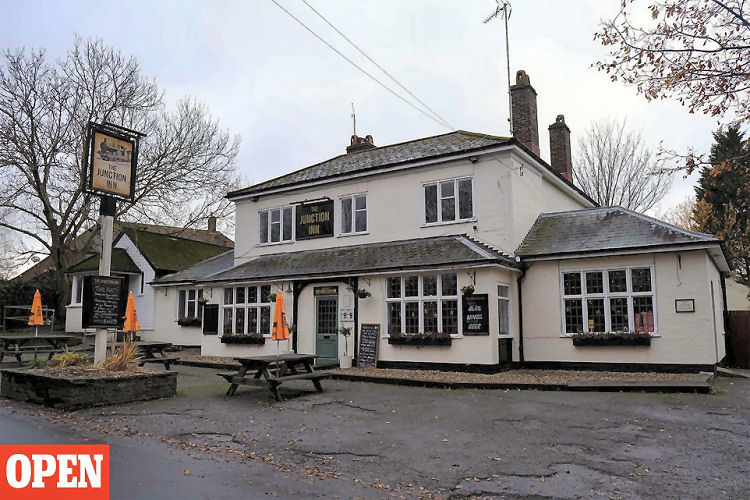
During the covid lockdown to start on 2nd December 2020, as the pub
is deemed to be in East Sussex which was in tier 2, this was allowed
to remain open, yet the "Crown" a short walk away and
addressed as Kent " which was in tier 3 was not allowed to trade at
all. |
LICENSEE LIST
TANNER Edward M 1873-1901+ (age 44 in 1901 ) )
TANNER Frederick (son) 1902

???? Sue & John 1980s
 Census Census
|






